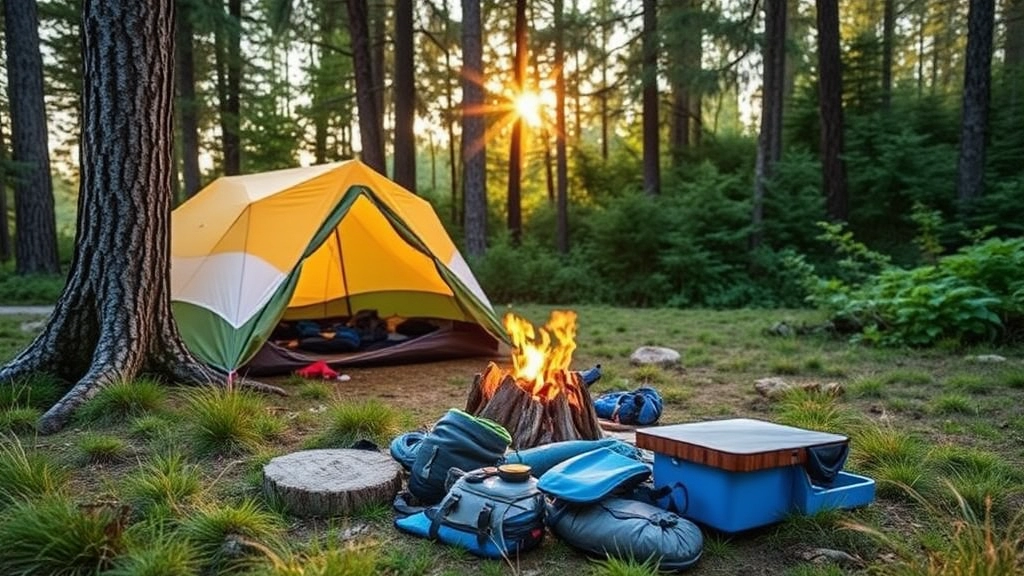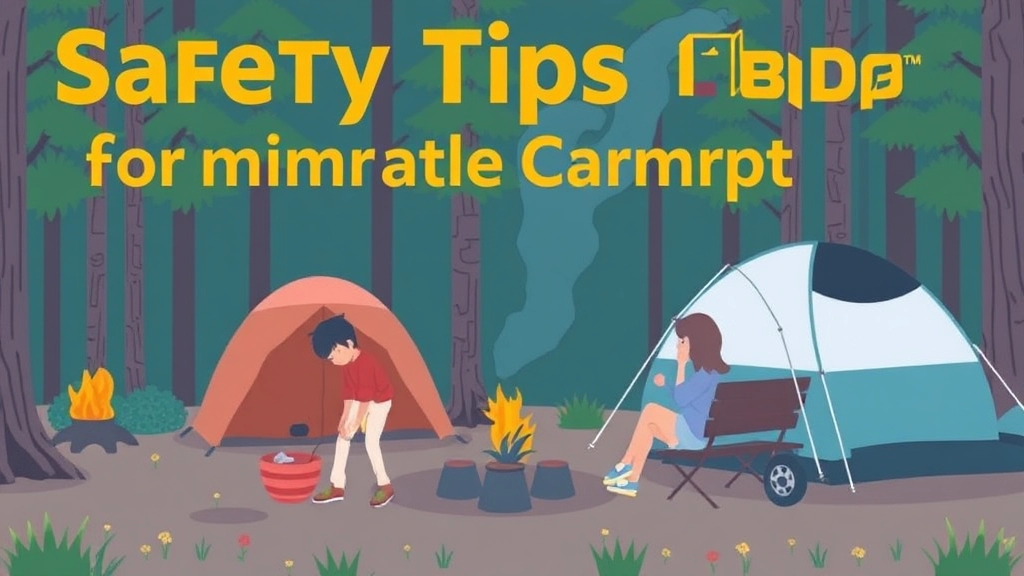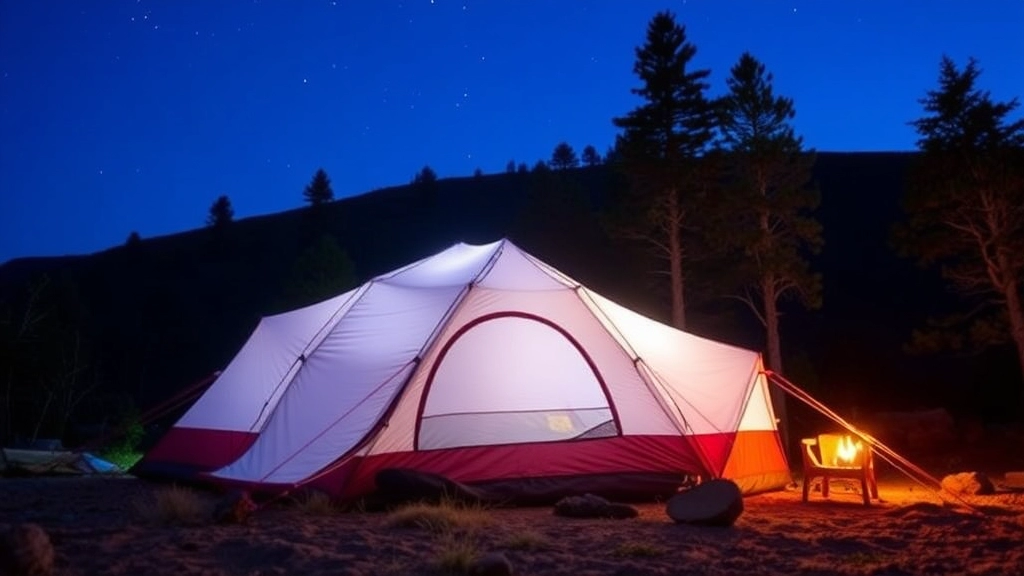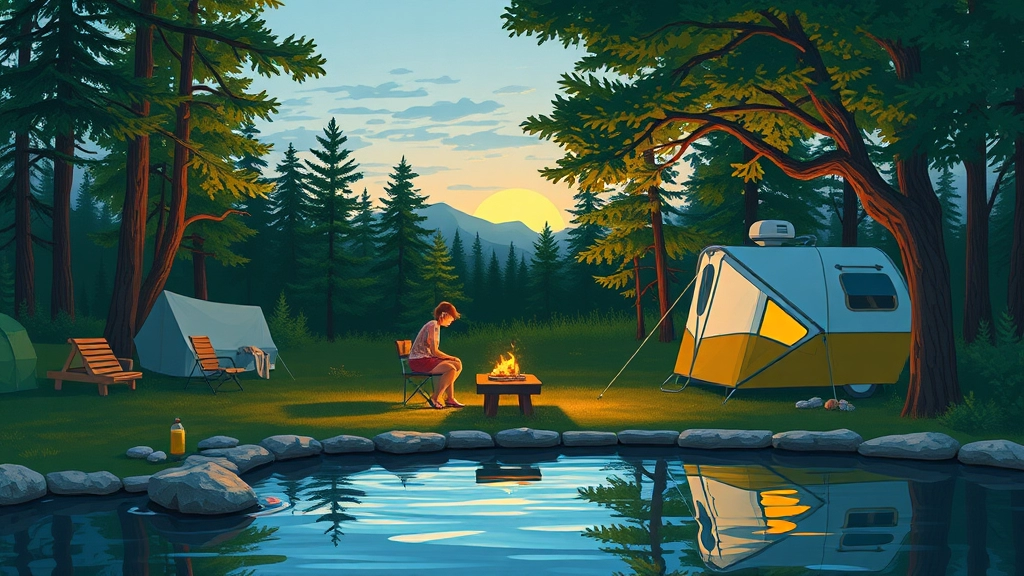Camping in the Summer: A Cherished Activity
Camping in the summer is a cherished activity that offers the perfect blend of adventure and relaxation. In this comprehensive guide, we’ll explore everything from the best summer camping destinations to essential gear and tips for staying cool. We’ll also delve into family-friendly activities, campfire cooking ideas, and crucial safety tips. Whether you’re a seasoned camper or a newbie, this article is packed with insights to make your summer camping trip unforgettable.
What You’ll Learn
From choosing the right tent to managing bugs and wildlife, we’ve got you covered. We’ll also highlight eco-friendly camping practices and how to plan the perfect trip. Imagine waking up to stunning views, engaging in fun activities, and enjoying delicious campfire meals—all while staying safe and respecting nature.
Get Ready for Your Adventure
So, grab your gear and let’s dive into the ultimate guide to camping in the summer!
Best Summer Camping Destinations
Where Should I Go Camping This Summer?
Alright, let’s cut to the chase. You’re itching to get out there, but where should you pitch your tent? Finding the best summer camping destinations can be a game-changer for your trip. You want a spot that ticks all the boxes: stunning views, activities for everyone, and, of course, decent weather.
Top Picks for Summer Camping
Here’s a list of some killer spots to consider:
- Lake District, England
Imagine waking up to serene lakes and rugged mountains. The Lake District offers a mix of hiking, boating, and picturesque landscapes that are perfect for both adventure seekers and those wanting to chill. - Snowdonia, Wales
If climbing mountains is your thing, Snowdonia should be on your radar. Besides the famous Mount Snowdon, there are plenty of trails and hidden gems to explore. - Cairngorms National Park, Scotland
This one’s for the wild at heart. With vast woodlands, rivers, and wildlife, Cairngorms is a dream for those wanting to escape the hustle and bustle. - New Forest, England
Perfect for families, New Forest offers gentle trails, pony spotting, and a more relaxed camping experience. Plus, it’s packed with history and charming villages. - Brecon Beacons, Wales
Think waterfalls, caves, and starry nights. Brecon Beacons is not only stunning but also an International Dark Sky Reserve, making it ideal for stargazing.
Why These Destinations?
Let’s break it down:
- Variety of Activities: From hiking and biking to water sports and wildlife spotting, these spots offer something for everyone.
- Accessibility: Whether you’re driving or taking public transport, these locations are relatively easy to get to.
- Family-Friendly: Plenty of amenities and activities to keep the kids entertained.
- Natural Beauty: Stunning landscapes that make for Instagram-worthy snaps.
Personal Favourites
For me, the Lake District is unbeatable. I remember a trip where we hiked up Helvellyn and camped by Ullswater. The views were jaw-dropping, and the sense of accomplishment was through the roof. Plus, nothing beats a lakeside campfire under the stars.
Quick Tips for Choosing Your Spot
- Research the Weather: Summer can be unpredictable. Check forecasts and pack accordingly.
- Book in Advance: Popular spots can fill up quickly. Secure your spot early.
- Check Amenities: Make sure the campsite has what you need, whether it’s toilets, showers, or a shop.
Internal Links
For more on how to make the most of your camping trip, check out our sections on Top Tips for Summer Tent Camping and Summer Camp Packing Checklist.
Essential Gear for Summer Camping

Alright, let’s talk about the essential gear for summer camping.
Ever been out in the wild, sweating buckets, and realised you forgot something crucial?
Yeah, me too.
Let’s make sure that doesn’t happen again.
Must-Have Gear
First things first, you need the right gear to beat the heat and stay comfy. Here’s what you can’t go without:
- Lightweight Tent: Go for a tent with good ventilation. Mesh windows and doors are a must. No one wants to wake up in a sauna.
- Sleeping Bag: Ditch the heavy-duty winter bag. Opt for a lightweight, breathable sleeping bag. Trust me, you’ll thank me later.
- Sleeping Pad: A good sleeping pad not only adds comfort but also keeps you off the hot ground. Get one that packs small and weighs little.
- Portable Fan: A battery-operated fan can be a lifesaver. It’s small, easy to carry, and makes a world of difference on those muggy nights.
Cooking and Hydration
You’ve got to eat and stay hydrated. Here’s what to pack:
- Cooler: A high-quality cooler keeps your food fresh and drinks cold. Look for one with good ice retention.
- Portable Stove: Forget the campfire when it’s blazing hot. A portable stove is quicker and doesn’t add to the heat.
- Water Bottles and Hydration Packs: Staying hydrated is non-negotiable. Bring plenty of water bottles and consider a hydration pack for hikes.
Clothing and Protection
What you wear and how you protect yourself can make or break your trip:
- Moisture-Wicking Clothes: Cotton is out. Go for synthetic fabrics that wick away sweat.
- Sun Protection: Sunscreen, hats, and sunglasses are essential. You don’t want to end up looking like a lobster.
- Bug Repellent: Mosquitoes and ticks are the worst. Pack a good bug spray and consider bringing a bug net.
Extra Gear
Here are a few more items that can make your trip smoother:
- Headlamp or Flashlight: Navigating the campsite at night is much easier with a reliable light source.
- First Aid Kit: Accidents happen. Be prepared with a basic first aid kit.
- Multi-Tool: A good multi-tool can handle a variety of tasks, from cutting rope to opening cans.
Stay Cool and Have Fun
Summer camping is all about enjoying the great outdoors without sweating the small stuff.
Pack smart, stay cool, and make the most of your adventure.
Campfire Cooking Ideas for Warm Weather
Ever wondered how to keep your campfire meals exciting and suitable for warm weather? You’re not alone. Let’s dive into some practical and tasty campfire cooking ideas that’ll keep you and your crew satisfied.
Why Campfire Cooking?
Camping is all about the experience, and cooking over a campfire is a big part of that. But when it’s warm, you need meals that are light, easy, and don’t leave you sweating buckets.
Quick and Easy Campfire Meals
- Foil Packet Dinners
- Ingredients: Chicken, veggies, herbs, and a splash of olive oil.
- Method: Wrap everything in foil and toss it onto the coals. Simple, right?
- Why It Works: Minimal cleanup and endless variations.
- Grilled Skewers
- Options: Chicken, beef, or veggie.
- Pro Tip: Marinate before you go to save time.
- Benefits: Quick to cook and fun to eat.
- Campfire Quesadillas
- Fillings: Cheese, beans, and your favourite salsa.
- How-To: Grill on a pan over the fire.
- Perks: Melty goodness in minutes.
Sweet Treats for the Campfire
- S’mores with a Twist
- Try Adding: Peanut butter or banana slices.
- Why You’ll Love It: A classic with a flavour boost.
- Campfire Cones
- Fill With: Marshmallows, chocolate chips, and fruit.
- Cook: Wrap in foil and heat until gooey.
- Fun Factor: Perfect for kids and adults alike.
Stay Cool While Cooking
Cooking over a campfire can get hot, so here are some tips to keep your cool:
- Choose the Right Time: Cook in the early morning or late evening.
- Set Up in the Shade: Use natural cover or a tarp.
- Hydrate: Keep water handy and stay refreshed.
Real Stories, Real Solutions
I remember a camping trip where we tried to make a full roast dinner over the fire. Spoiler: it was a disaster. We learned that keeping it simple is key, especially in warm weather. That’s why these easy campfire meals are a game-changer.
For more tips on staying cool while camping, check out our guide on Top Tips and Gear Essentials for Summer Camping. And if you’re planning your next adventure, don’t miss our section on Ultimate Summer Camp Calendar Guide.
Safety Tips for Summer Camping

Are you worried about staying safe while camping this summer?
You’re not alone.
Let’s dive into some practical tips to keep you and your family safe during your outdoor adventures.
Stay Hydrated
Dehydration can sneak up on you.
Especially in the summer heat.
Here’s how to stay ahead of it:
- Drink plenty of water.
- Avoid excessive caffeine and alcohol.
- Carry a reusable water bottle.
Sun Protection
Sunburns are no joke.
They can ruin your trip and harm your skin.
Simple steps to protect yourself:
- Wear sunscreen with at least SPF 30.
- Reapply every two hours.
- Use hats and sunglasses.
- Seek shade during peak sun hours.
Be Weather-Wise
Summer weather can be unpredictable.
Keep these in mind:
- Check the forecast before you go.
- Pack for sudden changes in weather.
- Have a plan for thunderstorms.
Fire Safety
A campfire is fun but can be dangerous.
Stay safe with these tips:
- Keep fires small and manageable.
- Never leave a fire unattended.
- Have a bucket of water or sand nearby.
- Fully extinguish the fire before sleeping or leaving the site.
Wildlife Awareness
Animals are part of the camping experience.
But you don’t want a close encounter.
Here’s how to avoid them:
- Store food in sealed containers.
- Keep your campsite clean.
- Dispose of rubbish properly.
- Know what wildlife is in the area and how to react.
First Aid Kit
Accidents happen.
Be prepared.
Your kit should include:
- Bandages and antiseptic wipes.
- Pain relievers.
- Tweezers and scissors.
- Any personal medications.
Navigation Tools
Getting lost is a real fear.
Stay on track:
- Carry a map and compass.
- Use GPS devices.
- Stick to marked trails.
Buddy System
Never venture out alone.
Why it’s important:
- You can help each other in emergencies.
- Share the load of carrying supplies.
- More eyes on potential hazards.
Emergency Contacts
Know who to call if things go south.
Keep these handy:
- Local emergency numbers.
- Campsite management contact.
- Family or friends who know your plans.
Eco-Friendly Camping Practices
Ever wondered how you can enjoy the great outdoors without leaving a negative impact on it? Eco-friendly camping practices are the way to go. Let’s dive into some practical tips to ensure your camping trip is as green as the lush forests you’ll be exploring.
Why Go Green?
First off, why should we even care about eco-friendly camping? Simple. Nature gives us so muchâpeace, adventure, and memories. It’s only fair to give back by protecting it. Plus, who wants to camp in a litter-strewn site or drink from a polluted stream? Not me, and probably not you either.
Pack Smart, Pack Light
When it comes to eco-friendly camping, less is more. Here’s what you need to keep in mind:
- Reusable Containers: Ditch the single-use plastics. Opt for reusable water bottles, food containers, and utensils.
- Biodegradable Products: From soap to toilet paper, choose items that break down naturally.
- Eco-Friendly Gear: Invest in gear made from sustainable materials. Think bamboo utensils and recycled fabric tents.
Leave No Trace
The golden rule of eco-friendly camping is to leave no trace. Here’s how you can do it:
- Clean Up: Always pack out what you pack in. Bring along garbage bags and make sure to leave your campsite cleaner than you found it.
- Stay on Trails: Stick to designated paths to avoid trampling vegetation.
- Respect Wildlife: Observe animals from a distance. Never feed them, as it disrupts their natural habits.
Smart Campfires
Campfires are a staple of camping, but they can be harmful if not managed properly. Let’s keep it safe and green:
- Use Existing Fire Rings: If a campsite has a fire ring, use it. Don’t create new fire pits.
- Keep It Small: A small fire uses less wood and is easier to control.
- Burn Local Wood: Avoid bringing firewood from home. It can introduce invasive species to the area.
Water Conservation
Water is life, especially when camping. Here’s how to conserve it:
- Quick Showers: If you have access to a shower, keep it short.
- Collect Rainwater: Use a tarp to collect rainwater for washing dishes or putting out the campfire.
- Eco-Friendly Soap: Use biodegradable soap and wash dishes at least 200 feet away from any water sources.
Renewable Energy
Why not harness the power of the sun while you’re out there? Solar gadgets are your best friend:
- Solar Chargers: Keep your devices charged without draining batteries.
- Solar Lights: Use solar-powered lights instead of battery-operated ones.
Real Stories, Real Impact
I remember my first eco-friendly camping trip. I was sceptical, thinking it would be a hassle. But when I saw how pristine we left our campsite, I was hooked. It felt good knowing we enjoyed nature without harming it. For more tips on how to make your camping experience enjoyable, check out our guide on top tips and gear essentials. Additionally, if you’re looking for a comprehensive packing list to ensure you have everything you need, don’t miss our summer camp packing list.
Choosing the Right Tent for Summer Camping

Ever been stuck in a sweltering tent, sweating buckets and swatting bugs all night?
Yeah, me too.
Choosing the right tent for summer camping can make or break your trip.
Let’s dive in.
What Makes a Tent “Summer-Ready”?
First off, ventilation.
You need a tent that breathes better than a marathon runner.
Look for mesh panels and multiple windows.
They let the breeze in and keep the bugs out.
Key Features to Look For
- Lightweight Fabric: Heavy-duty tents are great for winter, but in summer, you want something light and airy.
- UV Protection: The sun can be brutal. A tent with UV-resistant fabric keeps you from feeling like a roasted chicken.
- Easy Setup: Who wants to wrestle with poles and stakes in the heat? Look for a tent that’s quick and easy to pitch.
Size Matters
Cramped quarters can turn your trip into a nightmare.
Choose a tent with enough space to move around.
Tip: If it says “4-person tent,” it’s usually comfortable for 3.
Real-Life Example
Last summer, I picked up a tent with all the bells and whistles.
Mesh panels, UV protection, you name it.
Set it up in 10 minutes flat.
Best camping trip ever.
Internal Links for More Tips
Want to stay cool while camping? Check out our tips here.
Need help with gear? We’ve got you covered here.
Managing Bugs and Wildlife
Alright, let’s get real. One of the biggest concerns when camping in the summer is dealing with bugs and wildlife. Nobody wants to be constantly swatting mosquitoes or waking up to find a raccoon rifling through their stuff. So, how do we manage these pesky intruders? Let’s break it down.
Why Bugs and Wildlife Are a Problem
First off, bugs can be more than just annoyingâthey can carry diseases. And wildlife? Well, they can be unpredictable and sometimes dangerous. But don’t worry, we’ve got some solid strategies to keep both at bay.
Essential Tips for Keeping Bugs Away
- Use Bug Repellent: This might seem obvious, but not all repellents are created equal. Look for ones containing DEET, Picaridin, or natural oils like eucalyptus. Spray it on exposed skin and clothing.
- Wear Appropriate Clothing: Long sleeves and trousers might not be your first choice in the heat, but they’re a great barrier against bites. Opt for lightweight, breathable fabrics.
- Set Up Camp Wisely: Avoid stagnant water and heavily wooded areas. These are prime breeding grounds for mosquitoes and other insects.
- Use Mosquito Nets: If you’re in a buggy area, a mosquito net over your sleeping area is a game-changer.
- Citronella Candles and Lanterns: These can help create a bug-free zone around your campsite.
Handling Wildlife Encounters
- Proper Food Storage: Store food in sealed containers and keep it in your car or a bear-proof locker. Never leave food out in the open.
- Clean Campsite: Keep your campsite clean. Dispose of trash properly and avoid leaving scraps around.
- Know the Wildlife: Research the local wildlife before you go. Knowing what animals are in the area and how to react if you encounter them can be lifesaving.
- Make Noise: Most animals will avoid humans if they know you’re there. Make noise while hiking to prevent surprising any wildlife.
- Carry Bear Spray: If you’re in bear country, bear spray is a must. Know how to use it and keep it accessible.
Real Stories, Real Solutions
I remember one summer camping trip where we set up near a beautiful lake. The view was fantastic, but the mosquitoes were relentless. We quickly learned the importance of setting up camp away from stagnant water. We also discovered that wearing light-coloured clothing seemed to attract fewer bugs. It’s small tweaks like these that make a big difference.
Quick Recap
- Bug Repellent: DEET, Picaridin, natural oils
- Clothing: Long sleeves, trousers, breathable fabrics
- Camp Setup: Avoid stagnant water, use mosquito nets, citronella candles
- Food Storage: Sealed containers, bear-proof lockers
- Cleanliness: Keep campsite clean, dispose of trash properly
- Noise: Make noise to avoid surprising wildlife
- Bear Spray: Essential in bear country
For more tips on enjoying your summer camping experience, check out our top tips and gear essentials and learn how to capture those perfect moments with our guide to stunning summer camping photos.
Planning the Perfect Summer Camping Trip
Alright, let’s get real. Planning the perfect summer camping trip can be a bit of a headache, right?
You want everything to go smoothly, but there are a million things to consider.
Don’t worry, I’ve got your back.
Here’s how you can nail it without breaking a sweat.
Start with the Basics
First things first: Where are you going?
- Pick a destination that fits your vibe.
- National parks, beaches, mountains â the options are endless.
Next up: When are you going?
- Check the weather.
- Avoid peak seasons if you hate crowds.
Gear Up
You can’t have a perfect trip without the right gear.
Here’s a quick checklist:
- Tent: Make sure it’s suitable for summer.
- Sleeping Bag: Lightweight but warm enough for cool nights.
- Cooking Gear: Portable stove, utensils, and a cooler.
- Clothing: Breathable fabrics, hats, and sunglasses.
Plan Your Activities
What’s a camping trip without some fun?
Here’s what you could do:
- Hiking: Find trails that match your fitness level.
- Swimming: Lakes and rivers are perfect for a dip.
- Fishing: If you’re into it, find out if you need a permit.
- Stargazing: Bring a telescope or just lay back and enjoy.
Food and Water
You don’t want to be stuck in the wild without enough food and water.
- Meal Plan: Simple, easy-to-cook meals.
- Snacks: Nuts, energy bars, and fruits.
- Water: Bring more than you think you’ll need.
Safety First
Safety can’t be an afterthought.
- First Aid Kit: Must-have for any trip.
- Navigation: Maps, compass, or a GPS device.
- Emergency Contacts: Know who to call if things go south.
Eco-Friendly Practices
Leave no trace.
- Pack Out Trash: Don’t leave anything behind.
- Respect Wildlife: Keep your distance.
- Use Biodegradable Products: Soap, toothpaste, etc.
Final Checks
Before you head out, double-check everything.
- Weather Forecast: One last look.
- Reservations: Confirm if you’ve booked a spot.
- Packing List: Make sure you haven’t forgotten anything.
Real Talk
Last summer, I forgot to check the weather and ended up in a storm.
Learn from my mistake.
Always be prepared.
Remember, the goal is to have fun and make memories.
So, plan well, stay safe, and enjoy your perfect summer camping trip.
You’ve got this.
For more tips, check out our Top Tips for Summer Tent Camping.
And if you’re still figuring out where to go, explore our guide on Bucolic Summer Camps for Nature Adventure.
FAQs about Camping in the Summer
What is the essential gear for summer camping?
When it comes to summer camping, having the right gear is crucial for staying comfortable and safe. Essential items include a lightweight tent with good ventilation, a breathable sleeping bag, a sleeping pad, and a portable fan.
How should I stay hydrated during summer camping?
Staying hydrated is vital in the summer heat. Make sure to drink plenty of water, avoid excessive caffeine and alcohol, and carry a reusable water bottle. Using hydration packs can also be very effective, especially during hikes.
What kind of clothing is best for summer camping?
Opt for moisture-wicking clothes made from synthetic fabrics to keep sweat at bay. Additionally, ensure you have adequate sun protection like sunscreen, hats, and sunglasses, and don’t forget bug repellent to ward off insects.
How can I stay safe from the sun while camping?
Protect yourself from sunburns by wearing sunscreen with at least SPF 30, reapplying every two hours, using hats and sunglasses, and seeking shade during peak sun hours. These simple steps can help you enjoy your trip without the risk of sun damage.
What should I do to ensure fire safety while camping?
Keep campfires small and manageable, never leave them unattended, and always have a bucket of water or sand nearby. Fully extinguish the fire before sleeping or leaving the site to prevent any potential hazards.
What are the key features to look for in a summer camping tent?
A summer-ready tent should have excellent ventilation with mesh panels and multiple windows. Look for a tent made of lightweight fabric with UV protection and an easy setup process to ensure comfort and convenience.
How can I avoid wildlife encounters while camping?
Store food in sealed containers, keep your campsite clean, dispose of rubbish properly, and be aware of the wildlife in the area. Following these steps can help you avoid unwanted encounters with animals.
Why is a first aid kit important for summer camping?
Accidents can happen, so it’s essential to be prepared. A basic first aid kit should include bandages, antiseptic wipes, pain relievers, tweezers, scissors, and any personal medications you may need.
What are the benefits of using a buddy system while camping?
Camping with a buddy enhances safety as you can assist each other in emergencies, share the load of carrying supplies, and have more eyes on potential hazards. It’s always better to have someone with you in the great outdoors.
How can I navigate safely while camping?
Carry a map and compass, use GPS devices, and stick to marked trails to avoid getting lost. Proper navigation tools can help you stay on track and ensure a safe camping experience.
References
- The Ten Essentials: What to Take Hiking
- The Best Summer Sleeping Bags
- 8 Camping Gear Tips for Summer

